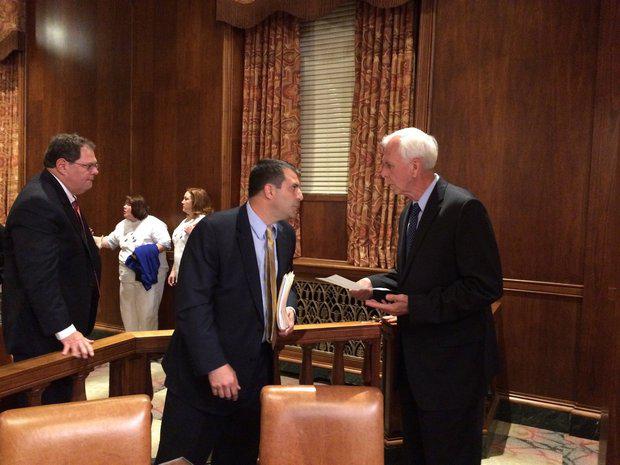|
No action taken on child sex crime bill by Senate panel; negotiations on amendments continue
By Ivey Dejesus
The head of the Senate Judiciary Committee, who last week stacked a hearing in favor of opponents seeking to defeat a proposed child sex crime reform bill, on Wednesday evening struck a more sensitive tone to victims of child sex abuse when asked why the panel had not taken action on the bill. Sen. Stewart Greenleaf, R-Montgomery County, said House Bill 1947 had not been taken up during a breakout meeting of the session on Wednesday because of ongoing negotiations to the bill. Greenleaf, chairman of the committee, said members of his committee were still considering negotiations with "regards to the legislation that give victims the ability to sue such as fraudulent concealment." As of midday Wednesday, it had not been confirmed whether the judiciary committee would take up the bill, amid negotiations to amendments. The panel met after a recess but did not take up the bill. Greenleaf added that there were "other things that could be done too..such as a witness fund." House Bill 1947 is at the center of a mounting call from victims of child sex abuse and their advocates. The bill would amend the state's child sex crime laws - the statute of limitations - eliminating all criminal time restraints to such crimes and amending its time provisions. The bill would extend the time frame victims could seek legal recourse against predators from age 30 to 50 - that same provision would apply retroactively to statutes that have expired. If passed, the bill would give scores of victims of child sex abuse - including those abused by priests - an opportunity to seek justice. During last week's hearing, the judiciary committee listened to five expert witnesses testify on the constitutionality of the bill - all but one said the bill would violate state constitution. Lawmakers have been under pressure from both sides of the issue - victims and their advocates on one side calling for reform, and powerful opponents of reform on the other side. The Pennsylvania Catholic Conference and business industry lobby groups, most notably, have argued that the retroactive measure would be detrimental to their interests. Victims and their advocates have been keeping close tabs on the bill since it moved to the chamber from the House in April. They widely claimed that Greenleaf has the ear of the Catholic Church and other powerful detractors of the bill. The bill passed in the House by a 180-15 vote. Preparing to return to the Senate session from the breakout meeting of his committee, Greenleaf said the Senate leadership were handling the negotiations - not he. Asked to comment on the validity of reports that the committee fully intends to strip out the retroactive language of the bill, Greenleaf said the committee "will decided that" and that the question should be put to "each member" of the committee. "We will make that decision when it happens," Greenleaf said. On Tuesday, an Altoona-based lawyer who has handled scores of cases involving victims of child sexual abuse, announced the lawsuits by two Blair County women who claim they were sexually abused as children by a priest of the Altoona-Johnstown Diocese. Richard Serbin is representing the women in civil action alleging fraud and concealment by the priest as well as church officials. A grand jury investigation concluded in March found that the Altoona-Johnstown Diocese had for decades known and concealed the systemic abuse of children by more than 50 priest. The priest named in the lawsuits from the women being represented by Serbin was named a serial predator in that investigation report. Greenleaf said that while victims already had legal recourse under "fraudulent concealment" claims, "there can be changes that make it easier to use." Asked if his committee was dodging making public announcements about its meetings on the bill because of reports that victims intend to flood the hearings, Greenleaf said, "No, that's ridiculous." Earlier on Wednesday, the office of Rep. Mark Rozzi, D-Berks, who helped steer the statute of limitations reform effort in the House, hand-delivered to Greenleaf and his committee members a letter urging them to move the bill to the Senate floor for a vote. Rozzi, a survivor of clergy sex abuse, criticized the committee for its lack of transparency in handling the bill. Rozzi chided the committee for what he said had been a lackadaisical handling of a hearing on the bill last week. "I understand that most people cannot really wrap their minds around the issue of child sex abuse, until they have personally met with victims, or read their stories or in the worse case, have suffered the same fate," Rozzi wrote. "Only then can one come to the clear understanding that statute of limitations laws are arbitrary and inherently unfair as they apply to child sex abuse." Rozzi cited his own abuse at the hands of his priest to make the case that expired civil statutes could be legally revived. "At the end of the day, what is clear to any right-minded person is that this committee should err on the side of victims," Rozzi wrote. "For once, vote House Bill 1947 as is without amendments and get this bill to the floor for a Senate vote." Contact: idejesus@pennlive.com
|
.
Any original material on these pages is copyright © BishopAccountability.org 2004. Reproduce freely with attribution.
